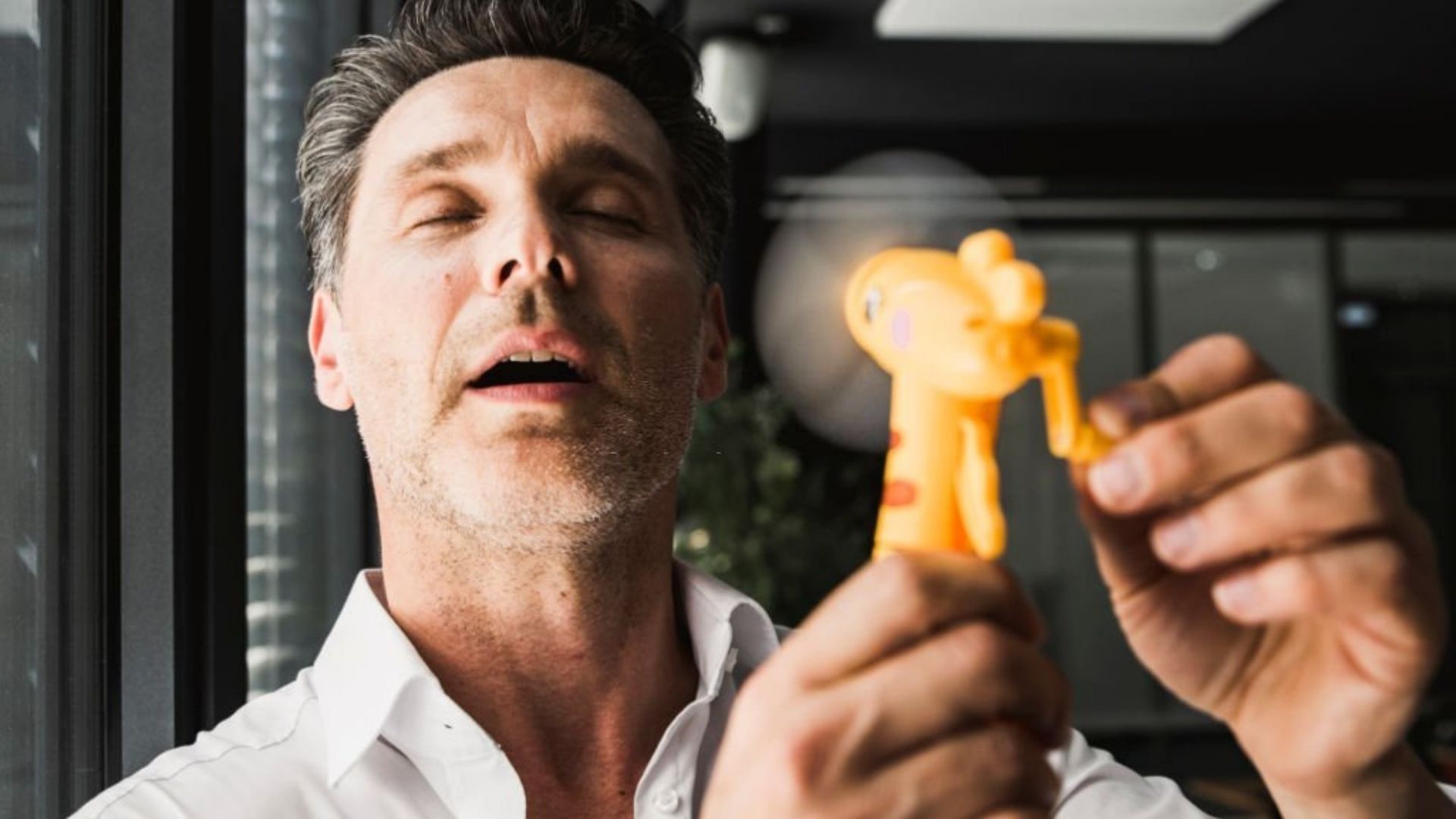
Hot Flashes in Men: Causes, Symptoms, and Coping Strategies
Hey there, friends! It’s your pal FitGAG here, and today we’re going to be talking about a topic that affects millions of men around the world: hot flashes. That’s right, hot flashes aren’t just something that women experience during menopause – men can experience them too! So, whether you’re a man who’s been struggling with hot flashes or you’re just curious about this common condition, you’re in the right place.
Hot Flashes in Men
Hot flashes are characterized by a sudden feeling of warmth that spreads over the body, often accompanied by sweating and flushing of the skin. In men, hot flashes can occur at any age, although they are more common in middle-aged and older men. While the exact cause of hot flashes in men is unknown, it is thought to be related to changes in hormone levels.
Frequency and Duration of Hot Flashes in Men
The frequency and duration of hot flashes in men can vary greatly. Some men may experience them only occasionally, while others may have several per day. The duration of a hot flash can range from a few seconds to several minutes. The intensity of a hot flash can also vary, ranging from mild to severe. Some men may experience a rapid heartbeat, chills, or feelings of anxiety or irritability during a hot flash.
Understanding the Causes of Hot Flashes in Men
Hot flashes in men are most commonly caused by changes in hormone levels, particularly a decrease in testosterone production. However, there are also several health conditions that can contribute to the development of hot flashes. Understanding the underlying causes of hot flashes can help men better manage their symptoms.
Hormonal Changes in Men
Hormonal changes are the primary cause of hot flashes in men. Testosterone is the primary male sex hormone and plays a crucial role in many bodily functions, including regulating body temperature. As men age, testosterone production naturally declines, which can lead to a range of symptoms, including hot flashes.
In addition to age-related hormonal changes, other factors can also contribute to hormonal imbalances, such as certain medical conditions, medications, and lifestyle factors.
Health Conditions Associated with Hot Flashes in Men
There are several health conditions that are associated with hot flashes in men, including:
- Hypogonadism: a condition in which the body doesn’t produce enough testosterone
- Thyroid disorders: an overactive or underactive thyroid gland can affect hormone levels and lead to hot flashes
- Diabetes: uncontrolled blood sugar levels can contribute to hormonal imbalances and hot flashes
- Prostate cancer and its treatments: hot flashes are a common side effect of hormone therapy for prostate cancer
- Infections: certain infections, such as tuberculosis and HIV, can cause hormonal imbalances and hot flashes
- Obesity: excess body fat can affect hormone levels and increase the risk of hot flashes
It’s essential to talk to a healthcare provider if you are experiencing hot flashes, as they can help identify any underlying health conditions that may be contributing to your symptoms.
Risk Factors for Hot Flashes in Men
Hot flashes are a common symptom experienced by many men, and understanding the risk factors can help men take steps to reduce their risk of developing hot flashes or manage their symptoms more effectively.
Age and Menopause
As men age, their testosterone levels naturally decline, which can lead to the development of hot flashes. While women typically experience hot flashes during menopause, men can experience them at any age, although they are more common in middle-aged and older men.
In addition to age-related hormonal changes, certain medical conditions, medications, and lifestyle factors can also contribute to hormonal imbalances and increase the risk of hot flashes.
Lifestyle Factors
Several lifestyle factors can increase a man’s risk of developing hot flashes, including:
- Smoking: smoking can lead to hormonal imbalances and increase the risk of hot flashes.
- Alcohol consumption: excessive alcohol consumption can affect hormone levels and increase the risk of hot flashes.
- High caffeine intake: consuming too much caffeine can lead to hormonal imbalances and contribute to hot flashes.
- Stress and anxiety: stress and anxiety can affect hormone levels and trigger hot flashes.
- Poor sleep habits: lack of sleep can disrupt hormonal balance and increase the risk of hot flashes.
- Sedentary lifestyle: a lack of physical activity can contribute to hormonal imbalances and increase the risk of hot flashes.
Making lifestyle changes such as quitting smoking, reducing alcohol and caffeine intake, managing stress, improving sleep habits, and increasing physical activity can help reduce the risk of developing hot flashes and improve overall health.
The Impact of Hot Flashes on Men’s Health
Hot flashes can have a significant impact on a man’s physical, psychological, and emotional health. Understanding the various ways that hot flashes can affect a man’s health can help him take steps to manage his symptoms and improve his quality of life.
Physical Symptoms of Hot Flashes
Hot flashes are characterized by sudden and intense feelings of warmth, which are often accompanied by sweating and flushing of the skin. These physical symptoms can be uncomfortable and disruptive to a man’s daily life. Some additional physical symptoms of hot flashes may include:
- Rapid heartbeat or palpitations
- Dizziness or lightheadedness
- Headache or nausea
- Chills or shivering
In addition, men who experience hot flashes may have trouble sleeping, which can lead to daytime fatigue and other health problems.
Psychological and Emotional Effects of Hot Flashes
In addition to the physical symptoms of hot flashes, men may also experience psychological and emotional effects, including:
- Anxiety or depression: hot flashes can be distressing and cause anxiety or depression.
- Irritability or mood swings: the sudden onset of hot flashes can cause irritability or mood swings.
- Difficulty concentrating: hot flashes can disrupt a man’s ability to concentrate or focus.
The psychological and emotional effects of hot flashes can have a negative impact on a man’s overall quality of life, leading to decreased productivity, social isolation, and relationship problems.
Diagnosis of Hot Flashes in Men
Hot flashes in men can be difficult to diagnose because the symptoms can be similar to other medical conditions. However, a proper diagnosis is important to determine the underlying cause of the hot flashes and to rule out any serious health problems.
Here are the common methods for diagnosing hot flashes in men:
Medical History and Physical Exam
A medical history and physical exam can help a healthcare provider identify the possible cause of hot flashes. The medical history may include questions about the onset and frequency of hot flashes, as well as any other symptoms experienced. During the physical exam, the healthcare provider may check for any signs of medical conditions that could be causing the hot flashes, such as high blood pressure or an overactive thyroid.
Blood Tests and Imaging Studies
Blood tests and imaging studies can help rule out any underlying medical conditions that could be causing hot flashes. Blood tests may include hormone tests, such as testosterone and thyroid hormone levels, as well as tests to check for conditions such as diabetes and high cholesterol. Imaging studies, such as ultrasounds or MRIs, may be used to check for any abnormalities in the thyroid gland or other organs that could be causing the hot flashes.
It is important for men to discuss their symptoms with a healthcare provider and undergo the necessary tests to determine the underlying cause of their hot flashes. A proper diagnosis can lead to effective treatment and relief of symptoms.
It is worth noting that hot flashes can also be a side effect of certain medications, so it is important for men to inform their healthcare provider of any medications they are taking. Additionally, lifestyle factors such as diet and exercise habits can also contribute to hot flashes, so these should be discussed with a healthcare provider as well.
Diagnosis of hot flashes in men may involve a medical history, physical exam, blood tests, and imaging studies. A proper diagnosis is crucial for effective treatment and relief of symptoms, and men should discuss any concerns with their healthcare provider.
Management of Hot Flashes in Men
Hot flashes in men can be managed in a variety of ways, including lifestyle changes and medications. Management options can be determined based on the frequency and severity of symptoms, as well as any underlying health conditions. Here are some of the most effective ways to manage hot flashes in men:
Lifestyle Changes
- Dress in layers to easily remove clothing as needed.
- Avoid triggers such as spicy foods, alcohol, caffeine, and tobacco.
- Stay cool with fans, air conditioning, or a cool shower.
- Exercise regularly to reduce stress and improve overall health.
- Practice relaxation techniques such as deep breathing, yoga, or meditation.
- Maintain a healthy weight, as being overweight can exacerbate hot flashes.
Medications for Hot Flashes
- Hormone replacement therapy (HRT) is the most effective medication for reducing hot flashes in men. HRT involves taking testosterone replacement therapy (TRT) to address hormonal imbalances that can lead to hot flashes.
- Antidepressants such as selective serotonin reuptake inhibitors (SSRIs) and serotonin-norepinephrine reuptake inhibitors (SNRIs) have been found to be effective in reducing hot flashes.
- Gabapentin, a medication used for seizures, has also been found to reduce hot flashes.
- Clonidine, a medication used to treat high blood pressure, has been found to be effective in reducing hot flashes.
It is important to note that medication options should be discussed with a healthcare provider, as they may have potential side effects and risks.
In addition to these management options, it is also important to address any underlying health conditions that may be contributing to hot flashes. A healthcare provider may recommend additional testing or treatment for conditions such as thyroid disorders or diabetes.
It may take some trial and error to find the most effective management strategy for hot flashes in men. It is important to keep track of symptoms and communicate with a healthcare provider about any changes or concerns. With the right management plan, hot flashes can be effectively managed, improving quality of life and overall health.
Natural Remedies for Hot Flashes in Men
Hot flashes can be managed using natural remedies such as herbal supplements and dietary changes. These options are often preferred by men who want to avoid the side effects of medications or who are looking for alternative methods to manage their symptoms. Here are some natural remedies that have been shown to be effective in managing hot flashes in men:
Herbal Supplements
Herbal supplements have been used for centuries to treat a variety of ailments, including hot flashes. Here are some examples of herbal supplements that may help manage hot flashes in men:
- Black cohosh: This herb is commonly used to manage hot flashes and other menopausal symptoms in women, but it can also be helpful for men. Black cohosh works by reducing the levels of luteinizing hormone, which is involved in the production of testosterone. This can help reduce the frequency and severity of hot flashes in men.
- Red clover: This herb contains phytoestrogens, which are compounds that mimic the effects of estrogen in the body. Red clover may help reduce hot flashes in men by regulating hormone levels.
- Dong quai: This herb is commonly used in traditional Chinese medicine to manage hot flashes and other menopausal symptoms. It contains compounds that can help regulate hormone levels and reduce the frequency and severity of hot flashes.
- Ginseng: This herb has been used for centuries to boost energy and reduce stress. Some studies suggest that ginseng may also help reduce hot flashes in men.
Before taking any herbal supplements, it’s important to talk to your doctor or a qualified herbalist to make sure they are safe for you to use.
Dietary Changes
Certain foods and drinks can trigger hot flashes in some men, so making dietary changes may help reduce their frequency and severity. Here are some tips:
- Avoid spicy foods, caffeine, alcohol, and sugary drinks: These can all trigger hot flashes.
- Eat more fruits, vegetables, and whole grains: These foods are high in fiber and can help regulate hormone levels.
- Increase your intake of foods high in phytoestrogens: These include soybeans, flaxseed, and tofu.
- Drink plenty of water: Staying hydrated can help reduce the frequency of hot flashes.
Making dietary changes can be challenging, but small changes over time can have a big impact on your symptoms.
Herbal supplements and dietary changes can be effective natural remedies for managing hot flashes in men. However, it’s important to talk to your doctor before taking any supplements or making major dietary changes.
Coping Strategies for Hot Flashes in Men
Hot flashes can be disruptive and frustrating, but there are ways to cope with them that can help you manage your symptoms and improve your quality of life. Here are some tips and strategies for reducing hot flash symptoms:
Tips for Reducing Hot Flash Symptoms
- Dress in layers so that you can easily remove clothing as needed.
- Avoid triggers such as spicy foods, alcohol, caffeine, and hot beverages.
- Stay hydrated by drinking plenty of water throughout the day.
- Practice relaxation techniques such as deep breathing, yoga, or meditation.
- Exercise regularly, but avoid intense workouts that may trigger hot flashes.
- Keep a cool environment by using fans, air conditioning, or a cool mist humidifier.
- Try acupuncture, which has been shown to reduce hot flash symptoms in some men.
Support Groups and Counseling
Living with hot flashes can be emotionally challenging, and it’s important to take care of your mental health as well. Support groups and counseling can provide a safe and supportive environment for you to share your experiences and feelings with others who understand what you’re going through. Some options to consider include:
- Online support groups, which can be accessed from the comfort of your own home.
- Local support groups, which may be offered through community centers, hospitals, or clinics.
- Individual counseling or therapy, which can help you manage stress and anxiety related to hot flashes.
- Couples counseling, which can help you and your partner communicate about how hot flashes are affecting your relationship.
In addition to these coping strategies, it’s important to remember that hot flashes are a normal part of aging and that they can be managed with the right combination of lifestyle changes, medication, and support. Don’t be afraid to reach out to your healthcare provider for guidance and support as you navigate this challenging time.
Hot Flashes and Sexual Health in Men
Hot flashes in men can have a significant impact on their sexual health, including their libido and sexual function. Men experiencing hot flashes may feel uncomfortable, anxious, or irritable, which can affect their desire and performance in the bedroom. Here are some ways hot flashes can affect sexual health in men:
Impact on Libido and Sexual Function
Hot flashes can lead to a decrease in testosterone levels in men, which can result in a reduced sex drive. Men may also experience erectile dysfunction or difficulty achieving and maintaining an erection. Hot flashes can also cause fatigue and physical discomfort, which may make it difficult for men to engage in sexual activity.
However, it’s important to note that not all men experience a decrease in libido or sexual function due to hot flashes. Some men may find that their sex drive increases during this time, while others may not notice any significant changes.
Addressing Sexual Concerns with a Healthcare Provider
If you’re experiencing hot flashes and noticing changes in your libido or sexual function, it’s important to speak with your healthcare provider. They can help identify the root cause of your symptoms and recommend appropriate treatments.
Your healthcare provider may recommend testosterone replacement therapy to help increase your libido and improve sexual function. They may also recommend medications such as sildenafil (Viagra) or tadalafil (Cialis) to help with erectile dysfunction.
In addition to medical treatments, there are several lifestyle changes you can make to help improve your sexual health. These may include maintaining a healthy diet and exercise routine, reducing stress, and quitting smoking.
It’s important to address any concerns about sexual health with your healthcare provider, as these issues can have a significant impact on your overall well-being and quality of life. With the right treatment and support, men can effectively manage hot flashes and maintain a healthy sex life.
Hot Flashes and Relationships
Hot flashes in men can have a significant impact on their personal relationships, including romantic partnerships. It can be challenging to communicate about hot flashes with a partner, but it’s crucial to do so in order to maintain intimacy and connection. Here are some tips for communicating with partners about hot flashes and maintaining healthy relationships:
Communicating with Partners about Hot Flashes
- Start the conversation: It’s essential to be open and honest about hot flashes with your partner. Start by expressing how you feel and what you need from them to feel supported.
- Educate them: Share information about hot flashes, including what they are, how they affect you, and what triggers them. This can help your partner understand your experience and how they can best support you.
- Be specific: Let your partner know what they can do to help you during a hot flash, such as getting you water or a cold compress. Specific suggestions can make them feel more empowered to assist you.
- Encourage questions: Encourage your partner to ask questions and seek understanding. This can help them feel more comfortable and better equipped to help you manage your symptoms.
- Express gratitude: Thank your partner for their support and understanding. Letting them know how much you appreciate their efforts can help maintain a positive dynamic.
Tips for Maintaining Intimacy and Connection
- Explore new ways of being intimate: Hot flashes can make traditional physical intimacy challenging, so consider exploring new ways of being intimate, such as cuddling or holding hands.
- Focus on emotional intimacy: Emotional connection is just as important as physical intimacy. Make time to talk, share your feelings, and show affection.
- Be patient and understanding: Remember that hot flashes can be frustrating and exhausting, and it’s not your fault. Be patient with yourself and your partner, and prioritize understanding and compassion.
- Take breaks when needed: If hot flashes are interfering with intimacy, it’s okay to take a break and come back to it later. Communication and understanding can help ensure that both partners feel supported and respected.
- Seek professional help: If hot flashes are causing significant strain on your relationship, consider seeking support from a couples therapist or sex therapist. They can help you navigate the challenges of hot flashes and maintain a healthy relationship.
Hot flashes can be a difficult experience, but it doesn’t have to negatively impact your relationships. By communicating openly with your partner and prioritizing emotional intimacy, you can maintain a strong connection and enjoy a healthy, fulfilling relationship.
When to Seek Medical Attention for Hot Flashes in Men
Hot flashes in men are a common experience that can be managed through lifestyle changes, medications, and natural remedies. However, there are certain situations in which seeking medical attention is necessary. Knowing the signs of serious health problems associated with hot flashes is essential for maintaining overall health and wellbeing. Additionally, consulting with a healthcare provider can help identify any underlying medical conditions that may be contributing to hot flashes and develop an appropriate treatment plan.
Signs of Serious Health Problems
Hot flashes can be a symptom of several serious health problems. If you experience any of the following symptoms, it is important to seek medical attention immediately:
- Chest pain or pressure
- Shortness of breath
- Rapid or irregular heartbeat
- Dizziness or lightheadedness
- Severe headaches
- Fainting or loss of consciousness
These symptoms may indicate a more serious underlying condition, such as a heart attack or stroke. It is essential to seek immediate medical attention if you experience any of these symptoms.
Reasons to Consult with a Doctor
If you are experiencing frequent or severe hot flashes, it is important to consult with a healthcare provider. There are several reasons why you may want to schedule an appointment with your doctor:
- Hot flashes are interfering with daily life and activities
- Hot flashes are causing significant discomfort or distress
- Hot flashes are accompanied by other symptoms, such as fever or weight loss
- Hot flashes occur suddenly and without warning
- Hot flashes are interfering with sleep and causing fatigue or insomnia
Your healthcare provider can perform a physical examination, review your medical history, and order blood tests or imaging studies to help identify the cause of your hot flashes. They can also provide guidance on lifestyle changes, prescribe medications, or refer you to a specialist if necessary.
Recognizing the signs of serious health problems associated with hot flashes and knowing when to consult with a healthcare provider is crucial for managing this common experience in men. Seeking medical attention can help identify any underlying medical conditions, develop a personalized treatment plan, and improve overall health and wellbeing.
Conclusion
Well folks, that’s a wrap! We’ve covered everything from the causes and symptoms of hot flashes in men to tips for managing them and seeking medical attention when necessary. Remember, if you or someone you know is experiencing hot flashes, it’s important to seek help and support. And if you want to stay up-to-date on all things health and wellness, be sure to follow FitGAG for more informative and entertaining articles!











